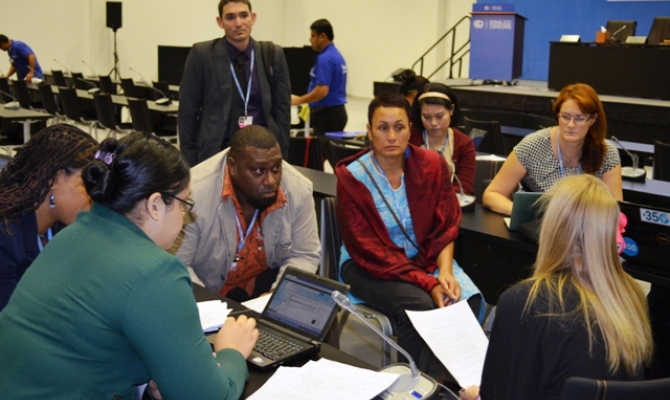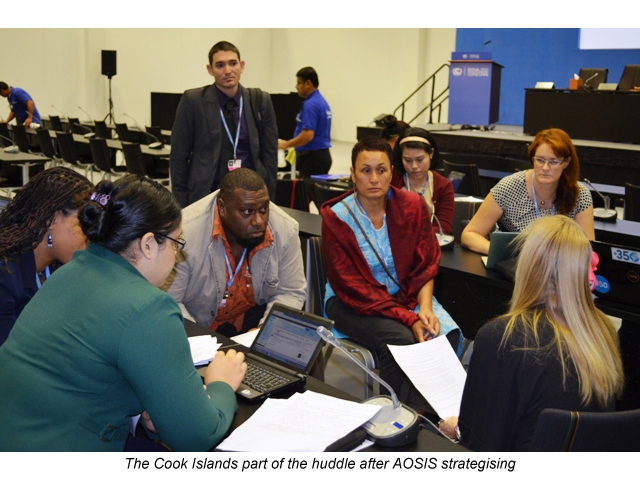
30 November, 2012, Doha, Qatar- The Cook Islands are expected to incur, on average, 5 million USD per year in losses due to weather-related events, making the loss and damage agenda a critical issue at the UN climate negotiations.
A World Bank report produced in 2011 as part of the Pacific Catastrophe Risk Assessment and Financing Initiative by the Secretariat of the Pacific Community provides alarming numbers for the island nation.

Cook Islands delegates are tracking Loss and Damage, working through the night on an agenda that has scheduled items through until 6.30am the next morning.
Loss and Damage is used in the United Nations Framework to the Convention on Climate Change (UNFCCC) to refer to a range of damage and permanent loss associated with certain climate change impacts.
These can include impacts from extreme weather events such as tropical cyclones or floods and slow onset events such as sea level rise or ocean acidification.
The 2011 report that assessed the cost of natural disasters on the country revealed that over the next 50 years, the Cook Islands have a 50% chance of experiencing a loss exceeding 75 million USD and casualties in excess of 130 people. There is a 10% chance of experiencing a loss exceeding 270 million USD and casualties in excess of 200 people.
"This would not be acceptable losses for the Cook Islands," said Ms. Ana Tiraa, Director of the Climate Change Division of the Office of the Prime Minister.
"The Cook Islands has set up a disaster trust fund to build resilience and reduce vulnerability with loss and damage from extreme weather events. But, this will not be enough to help us deal with the current and future impacts and potential losses and damage to our economy, our homes, our livelihoods and our families. "

Tiraa is following the Loss and Damage agenda item and is supported by Diane McFadzien, Ewan Cameron and Linda Siegele, all on the Cook Islands delegation.
The Cook Islands with the Alliance of Small Island States is calling for a three part international mechanism that addresses the loss and damage.
They are seeking an insurance component funded by developed countries to provide insurance payments for climate related damage and loss of infrastructure, homes and crops including the loss of income from tourism.
Secondly, there is the call for a compensatory element to provide financial assistance to the Cook Islands and fellow Pacific island countries to deal with the unavoidable loss and damage caused by climate change. This includes sea level rise that erodes the coast, freshwater sources and food crops contaminated by saline water and ocean acidification and coral bleaching.
Thirdly, a risk management component will enable, administer and support risk sharing and risk-transfer schemes for damage incurred by climate related disasters. An example of this is support for planning the best location and design for a building that could avoid immense damage from a tropical cyclone.
"As a small island developing state, the Cook Islands is facing a big problem in loss and damage. We know this. The latest science shows us that climate change impacts are escalating in an accelerated manner," said Tiraa.
"The recent SREX report makes it clear that sea level rise will contribute to increased extreme coastal high water levels, coupled with the likely increase in tropical cyclone maximum wind speed."
The SREX report is the Special Report on Managing the Risks of Extreme Events and Disasters to Advance Climate Change Adaptation by the Inter governmental panel on climate change.
Time is of the essence in negotiating an agreed text for final approval by all parties to the UNFCCC. A few parties have come together to work overnight to produce a conclusion with a draft decision to be adopted by the Subsidiary Body of Implementation (SBI) tomorrow. The SBI will then forward this to the Conference of the parties on the final day of the UN climate negotiations for all parties to adopt.
The 18th Conference of the Parties to the United Nations Framework Convention on Climate Change opened on November 26 and will close on 7 December.